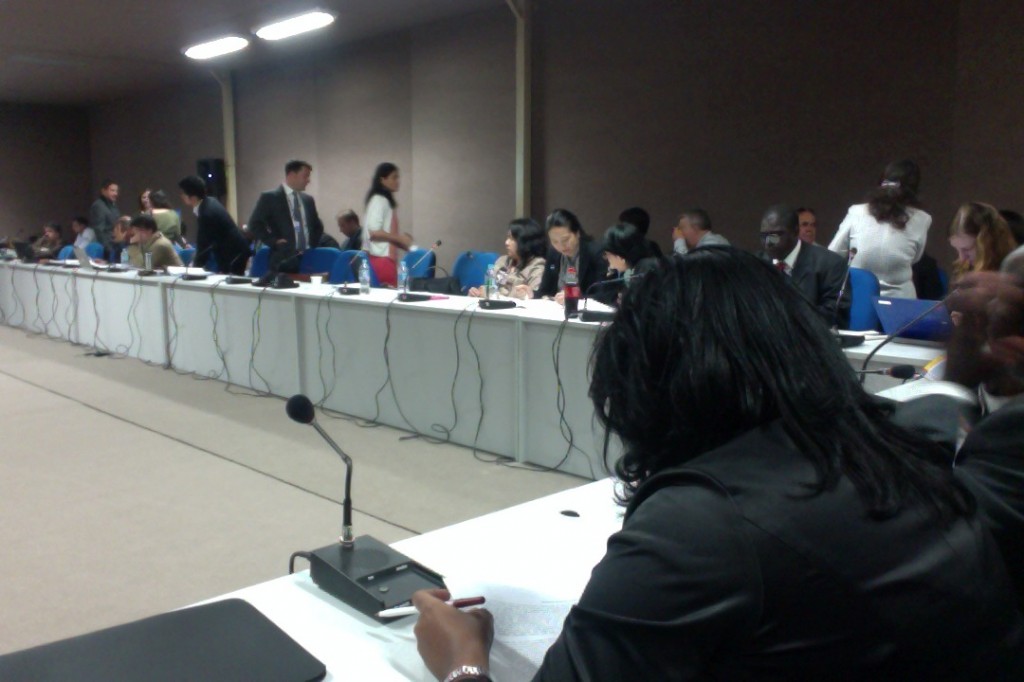by Julian Velez
Frente a la profunda crisis económica, social y ambiental de nuestro planeta nuestros gobiernos están fracasando en proponer soluciones reales y en priorizar el bienestar social y ambiental en sus agendas políticas. Esto se vive en las negociaciones del texto “The Future We Want” (El Futuro Que Queremos), plataforma de discusión de la Conferencia de Desarrollo Sostenible de las Naciones Unidas (ONU), Rio+20.
Los gobiernos del mundo están negociando soluciones a la crisis multifacética de hoy en día con el marco del desarrollo sostenible como la ruta a seguir; sin embargo, las negociaciones no están brindando respuestas reales a los problemas estructurales políticos, económicos y sociales de nuestro sistema neoliberal. Ya que este mantiene el poder corporativo, que es en gran parte responsable por la disparidad de la riqueza, la explotación del medio ambiente y múltiples injusticias laborales. Los gobiernos no escuchan las necesidades de la sociedad civil, y por eso la gente en Tahrir, Montreal, Chile, México y el movimiento global de “Occupy” está alzando su voz para exigir los cambios que la sociedad quiere ver.
Por las mismas razones, nosotros aquí en Rio+20 estamos alzando nuestra voz para cuestionar y retar las discusiones en torno a los temas incluidos en el texto de negociación que pretende articular soluciones a nuestro futuro. Pero éste falla en el intento. No describe el futuro que queremos y necesitamos. Por esto, nosotros, Earth in Brackets, proponemos “The Future We Really Want" (El Futuro Que Realmente Queremos), un documento que explora los problemas de raíz y genera propuestas a la esencia de los mismos.
Hasta el momento el desarrollo sostenible, tema principal de esta junta, no parece una prioridad para los gobiernos en Rio+20. El tema que esta generando mayor discusión es la iniciativa de la Economía Verde, propuesta que pretende impulsar el desarrollo sostenible y la erradicación de la pobreza, alejando la economía del dominio de los derivados del petróleo. Parte del problema es que no hay acuerdo respecto a la definición de la Economía Verde, pero hay muchas interpretaciones. El PNUMA (Programa de las Naciones Unidas para el Medio Ambiente), formuló dicha propuesta que en resumen dice que la Economía Verde está elaborada como una propuesta que mejora el bienestar humano por medio del crecimiento económico, mientras que asegura la protección de la naturaleza. Pero nosotros y otros grupos de la sociedad civil y las ONGs no piensan lo mismo.
La Economía Verde es un iniciativa enmascarada, no es una vía real para alcanzar un desarrollo sostenible. En realidad es una respuesta a la crisis financiera que pretende crear un nuevo método para salvar el sistema neoliberal que dominan los países desarrollados. Es un intento por rescatar a los mercados a toda costa, propone la mercantilización de la naturaleza incluyendo los servicios que brindan los ecosistemas. Es un camino que apunta hacia la legitimación y la mercantilización de la destrucción de la naturaleza. Se está proponiendo un nuevo patio de recreo para el poder privado, en donde la existencia de los recursos comunes queda en juego, ya que propone una economía basada en el crecimiento sostenido y en los mismos patrones de producción y consumo excesivos de nuestro sistema. La estrategia consiste en una perspectiva de “lavado verde” (presentar a la economía y sus productos como ecológicamente amigables), para que sea aceptado continuar creciendo a costa de la dependencia de los países subdesarrollados, de las injusticias laborales y la explotación de la naturaleza.
La sociedad civil y la juventud en Rio+20 está consciente que el proceso excluye su voz y los gobiernos no hablan por sus pueblos. Los intereses de la sociedad civil no están en la mesa, la Economía Verde no refleja los intereses ni las necesidades de la gente. Nosotros, la juventud, estamos conscientes que existen otras maneras para salvaguardar la naturaleza, no se necesitan valorizaciones monetarias, pues la naturaleza tiene derechos inherentes. Queremos ir mas allá del PIB con indicadores que reflejen el bienestar social, ambiental y económico. Necesitamos una nueva visión de lo que es desarrollo que esté basada en justicia y los derechos, no en el consumo y la producción. Bajo el principio de equidad, la economía debe conducir a una redistribución del poder y la riqueza entre los países. La transición debe estar basada en que los países tienen responsabilidades comunes pero diferenciadas con respecto a su realidad socio-económica y a su responsabilidad histórica de explotación de los recursos naturales.
En el futuro que realmente queremos, necesitamos un verdadero cambio, no queremos continuar por la misma vieja vereda con adornos nuevos. Se necesita un cambio de estructuras y de mentalidad que esté basado en la armonía con la naturaleza, la equidad entre las naciones, la igualdad en las sociedades, la salud social y ambiental. Los derechos humanos y del medio ambiente deben anular la mentalidad lucrativa.



